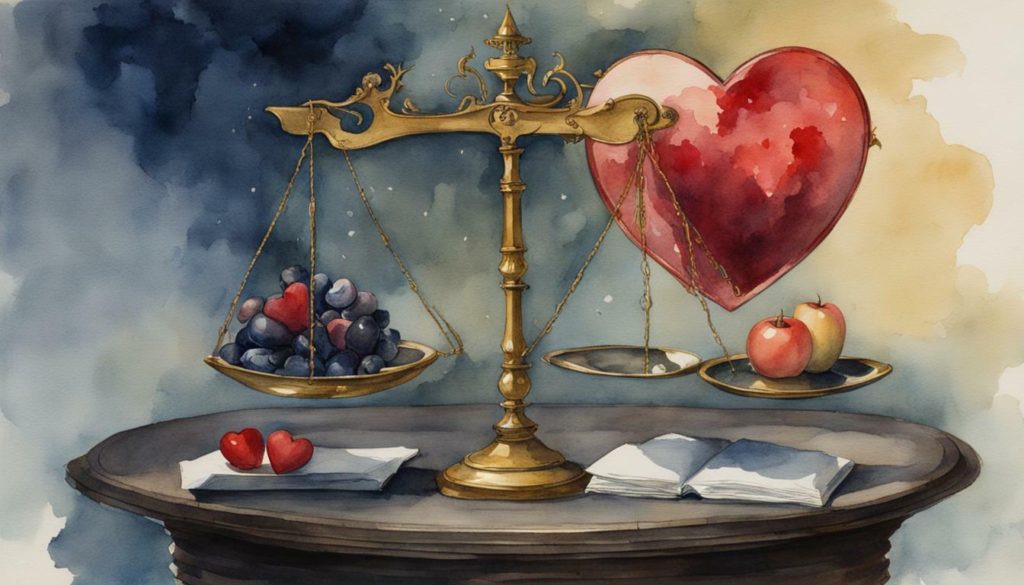Understanding if something is a sin can be challenging, but it is an important aspect of our spiritual journey. We often find ourselves grappling with the question of whether our actions align with God’s will and whether they please Him. In this article, we will explore the signs of sin and provide thoughtful and inspirational advice on how to navigate this complex topic.
- Sin is displeasing to God and goes against His holy law.
- Sin is not defined by personal opinion or societal norms, but by God’s standards.
- The Bible provides lists of specific sins, such as murder, lying, theft, and sexual immorality.
- In areas where the Bible does not directly address, we can consider whether the activity is definitely good, whether it pleases God, and whether it harms or influences others negatively.
- Our actions should be driven by love for God and others and guided by faith and conviction.
What is Sin?
To determine if something is a sin, we first need to understand what sin is. Sin is displeasing to God and goes against His holy law. It is not defined by personal opinion, societal norms, or psychological surveys. Sin, in its essence, is any lack of conformity to or transgression of God’s law.
In the Bible, we find lists of specific sins that are clearly outlined, such as murder, lying, theft, and sexual immorality. These serve as indicators of what actions are sinful and should be avoided. However, there are areas where the Bible does not directly address whether something is a sin.
In such cases, we can consider additional criteria for determining sinfulness. Firstly, we can ask ourselves whether the activity is definitely good and aligns with values that are pleasing to God. Secondly, we need to consider the impact our actions have on others. If our behavior harms or influences others negatively, it is likely an indicator of sinfulness. Finally, our actions should always be driven by love for God and others. Acting out of love rather than selfish desires is a powerful criterion for distinguishing between right and wrong.

Ultimately, determining if something is a sin requires spiritual discernment and a strong foundation of faith. It is a continuous journey of seeking wisdom and guidance from trusted sources, such as spiritual leaders and scripture. Self-reflection and repentance play a crucial role in recognizing and addressing any sinful behavior in our lives. It is through this process of growth and transformation that we can find forgiveness and redemption.
Biblical Examples of Sin
The Bible provides us with clear examples of specific sins that we should avoid. These examples serve as a guide for distinguishing right from wrong and help us navigate the complexities of moral decision-making. The Word of God lays out the consequences of sinful actions and reminds us of the importance of living a life that pleases Him.
“Thou shalt not murder,” states one of the commandments in Exodus 20:13. This serves as a powerful reminder that taking another person’s life is a grave sin and goes against God’s plan for human relationships. Similarly, the Bible warns against lying in Proverbs 12:22, which states, “The LORD detests lying lips, but he delights in people who are trustworthy.” These verses clearly illustrate the significance of avoiding these specific sins.
Additionally, theft and sexual immorality are explicitly condemned in the Bible. In Exodus 20:15, God commands, “You shall not steal,” emphasizing the importance of respecting the property and belongings of others. Furthermore, in 1 Corinthians 6:18, the apostle Paul warns against sexual immorality, stating, “Flee from sexual immorality. All other sins a person commits are outside the body, but whoever sins sexually, sins against their own body.” These biblical examples highlight the need to refrain from engaging in behaviors that harm ourselves and others.
While the Bible provides us with clear guidelines on certain sins, there are instances where we may encounter situations not directly addressed in Scripture. In such cases, it is essential to consider whether the activity is definitely good, whether it pleases God, and whether it harms or influences others negatively. Our actions should always be motivated by love for God and others, guided by our faith and conviction. Seeking wisdom and guidance from trusted sources, such as spiritual leaders and the scriptures, can provide further insight and clarity when discerning right from wrong.

| Sin | Biblical Reference |
|---|---|
| Murder | Exodus 20:13 |
| Lying | Proverbs 12:22 |
| Theft | Exodus 20:15 |
| Sexual immorality | 1 Corinthians 6:18 |
Beyond Biblical Examples
While the Bible provides guidance on many specific sins, there are areas where it does not directly address whether something is a sin. In these cases, we must rely on moral judgment and spiritual discernment to determine the right course of action. As believers, we are called to seek wisdom and guidance to navigate these gray areas and make choices that align with God’s will.
One way to exercise moral judgment is to consider whether the activity in question is definitely good. Is it something that contributes positively to our character, relationships, and society as a whole? We can reflect on the motives behind our actions and assess whether they align with the principles of love, justice, and integrity.
Spiritual discernment is another valuable tool in determining whether something is a sin. By seeking the guidance of the Holy Spirit and studying scripture, we can gain insight into God’s heart and intentions. Through prayer and meditation, we can cultivate a deeper understanding of His desires for our lives and discern whether our actions align with His plan.
It’s important to note that moral judgment and spiritual discernment are not infallible. We may still make mistakes or have differing interpretations. In these situations, it is crucial to maintain humility and a willingness to learn and grow. By seeking accountability and engaging in thoughtful discussions with trusted spiritual mentors, we can gain further clarity and refine our understanding of what is right and wrong.
Remember, the journey of discerning sinfulness requires ongoing reflection, assessment, and repentance. By continually seeking God’s wisdom, we can live lives that honor Him and contribute to the well-being of ourselves and others.

Pleasing God
One way to evaluate whether something is a sin is by considering if it pleases God. As believers, our ultimate goal should be to align our actions with His will. The Bible teaches us that God desires righteousness, holiness, and obedience from His followers. When we make choices that honor God and reflect His character, we can be confident that we are walking in the path of righteousness.
“So whether you eat or drink or whatever you do, do it all for the glory of God.” – 1 Corinthians 10:31
Our desire to please God should extend to all areas of our lives, including our thoughts, words, and actions. By seeking to please God, we can develop a deep and intimate relationship with Him. This involves examining our motives and intentions, and ensuring that they are rooted in love for God and others.

When faced with ambiguous situations or decisions, we can rely on our faith and conviction to guide us. Our faith gives us the wisdom and discernment to recognize sinfulness and make choices that honor God. And when we do fall into sin, we can turn to God in repentance, seeking His forgiveness and restoration. Through His grace and mercy, we can find healing and redemption.
Table 1: Sin Indicators
| Indicator | Description |
|---|---|
| Contrary to God’s Word | Actions that go against the teachings and principles of the Bible. |
| Harmful to Others | Actions that cause pain, suffering, or negative consequences to others. |
| Driven by Selfishness | Actions motivated solely by self-interest, without considering the well-being of others. |
| Displeasing to God | Actions that are contrary to God’s nature and character, causing Him sadness or disappointment. |
Determining Sinfulness
When trying to discern whether something is a sin, we can consider the indicators listed in Table 1. These indicators can help us evaluate our actions and intentions, providing guidance in making choices that honor God. However, it is important to remember that determining sinfulness is a deeply personal and spiritual matter. Seeking wisdom and guidance from trusted sources, such as spiritual leaders and scripture, can further aid us in our quest for understanding.
By consistently seeking to please God, being guided by faith and conviction, and considering the impact of our actions on others, we can navigate the complexities of determining sinfulness. Let us strive to live lives that reflect God’s love, grace, and righteousness.
Harm to Others
When determining if something is a sin, we should consider whether our actions harm or negatively influence others. The impact of our behavior on those around us is an important indicator of whether we are engaging in sinful behavior. Our actions should always strive to uplift and benefit others, rather than causing harm or leading them astray.
One way to gauge the harm caused by our actions is to examine the consequences they have on those who are affected by them. Are our actions causing pain, suffering, or distress to others? Are we influencing them to engage in behavior that goes against their values or beliefs? These are important questions to ask ourselves in our quest to live a righteous and honorable life.
“Do not let any unwholesome talk come out of your mouths, but only what is helpful for building others up according to their needs, that it may benefit those who listen.” – Ephesians 4:29
God calls us to love one another and to treat others with kindness, compassion, and respect. When our actions harm or negatively influence others, we are straying from this divine command. We should always strive to be a positive influence in the lives of those around us, lifting them up and helping them grow spiritually.

| Sinful Behavior | Harmful Consequences |
|---|---|
| Lying | Destroys trust and damages relationships |
| Stealing | Infringes on the rights and well-being of others |
| Gossiping | Spreads negativity and can ruin reputations |
| Manipulation | Causes emotional harm and undermines autonomy |
By considering the impact of our actions on others, we can better discern whether something is a sin. Let us strive to be mindful of the harm we may cause and instead choose actions that promote love, kindness, and harmony in our relationships.
Motivated by Love
Our actions should be driven by love for God and others, guiding us away from sinful behavior. When we truly love God and seek to honor Him, we naturally desire to live in a way that is pleasing to Him. This means aligning our actions with His will and following His commandments.
Love for others also plays a crucial role in recognizing sinful actions. When we love our neighbors as ourselves, we are compelled to treat them with kindness, respect, and compassion. This love motivates us to avoid behavior that may harm or negatively influence others. It prompts us to consider the well-being and welfare of those around us.
In the pursuit of love for God and others, we are guided by the principles of faith and conviction. Our beliefs and values shape our behavior, and we strive to live in accordance with them. By living out our faith and convictions, we not only avoid sinful actions but also demonstrate our commitment to following God’s ways.
Ultimately, recognizing sinful actions and choosing to act out of love for God and others requires self-reflection and a humble heart. It is an ongoing journey of seeking wisdom, guidance, and forgiveness. As we grow spiritually, we gain a deeper understanding of what it means to live a life that is pleasing to God and beneficial to those around us.

| Examples of Sin | Actions Motivated by Love |
|---|---|
| Murder | Protecting and preserving life |
| Lying | Speaking the truth in love |
| Theft | Respecting others’ property and possessions |
| Sexual Immorality | Valuing purity and honoring God’s design for relationships |
Guided by Faith and Conviction
When faced with uncertainty, we can rely on our faith and convictions to guide us in determining if something is a sin. Our beliefs and values play a crucial role in shaping our understanding of right and wrong. By aligning our actions with our faith and convictions, we can navigate the complexities of life and make choices that honor God.
Having a strong foundation of faith and conviction provides us with a moral compass. It helps us discern what is pleasing in the sight of God and what goes against His teachings. Our faith reminds us of the principles we hold dear and the values that define us as followers of Christ. When we encounter situations that challenge our understanding of sin, we can turn to Scripture, prayer, and spiritual guidance to seek clarity and wisdom.
Our actions should be driven by love for God and others and guided by faith and conviction.
As we deepen our relationship with God, our convictions are strengthened. We become more attuned to His voice and discern His will for our lives. Our faith reminds us that we are not alone in our journey but are guided by the presence of the Holy Spirit. It is through this divine guidance that we can discern whether something is in alignment with God’s plan or if it strays from His path.
However, it is important to remember that our faith and convictions are not static. We are called to continually grow in our understanding of God’s Word and allow the Holy Spirit to shape and transform us. This means being open to reevaluating our beliefs and being willing to let go of ideas that do not align with the truth of the Gospel.
Ultimately, our faith and convictions should lead us to a place of humility, love, and grace. When we approach the question of determining sinfulness with a sincere desire to honor God, our faith and convictions become powerful guides. By living out our beliefs with authenticity and integrity, we can navigate the complexities of life and find peace knowing that we are following the path God has set before us.

When faced with moral dilemmas, it is important to seek wisdom and guidance from trusted sources. We may find ourselves uncertain about whether a particular action or decision is sinful or not. In such moments, it is wise to turn to those who have a deep understanding of God’s word and can offer insights and guidance based on biblical teachings.
Trusted spiritual leaders, mentors, and counselors can provide valuable perspectives and advice when we are grappling with questions of right and wrong. Their experience and knowledge can help shed light on complex situations and help us navigate through the moral intricacies of life. Seeking their guidance allows us to tap into the wisdom accumulated through generations of faith and practice.
Additionally, the Scriptures themselves serve as a rich source of guidance. The Bible offers timeless principles and teachings that can help us make informed decisions and discern between what is pleasing to God and what is not. Regular study and reflection on the Word can deepen our understanding of sin and righteousness, equipping us with the knowledge needed to make wise choices.
| Proverbs 11:14 | “Where there is no guidance, a people falls, but in an abundance of counselors, there is safety.” |
|---|---|
| Psalm 119:105 | “Your word is a lamp to my feet and a light to my path.” |
| James 1:5 | “If any of you lacks wisdom, let him ask God, who gives generously to all without reproach, and it will be given him.” |
Ultimately, seeking wisdom and guidance is an act of humility and an acknowledgment that we do not possess all the answers. By consulting trusted sources and immersing ourselves in God’s Word, we open ourselves to divine guidance and insight. Through this process, we can gain greater clarity on what is sinful and what is righteous, enabling us to live lives that honor God and align with His will.

We must remember that seeking wisdom and guidance is not a one-time event, but an ongoing journey. As we face new challenges and encounter unfamiliar situations, we can continue to seek the wisdom of others and seek the guidance of the Lord. By doing so, we cultivate a deepening understanding of sin and righteousness, and grow in our ability to discern God’s will in every aspect of our lives.
Reflection and Repentance
Recognizing sinfulness involves reflecting on our actions and being willing to repent and seek forgiveness. It requires us to honestly evaluate our thoughts, words, and deeds, and compare them to the standards set by God. This introspection allows us to identify areas where we have fallen short and acknowledge the need for change.
Self-reflection is not always easy. It requires humility and a willingness to confront our own shortcomings. However, by examining our actions through the lens of God’s truth, we pave the way for personal growth and transformation. It is through this process that we can find the strength to turn away from sinful behavior and strive towards a life that is pleasing to God.
Repentance is a vital step in the journey of recognizing sinfulness. It is more than just feeling sorry or guilty for our actions. True repentance involves a sincere desire to change and a commitment to turning away from our sinful ways. It requires us to seek forgiveness from God and from those we may have hurt or wronged.
As we reflect on our actions and repent, we open ourselves to God’s grace and mercy. We invite Him to work in our lives, transforming us from the inside out. Through the power of forgiveness, we find hope and restoration. God’s love is always available to us, ready to guide us towards a life of righteousness and holiness.

| Key Steps in Reflection and Repentance | Benefits |
|---|---|
| 1. Reflect on actions honestly | – Personal growth and transformation |
| 2. Compare actions to God’s standards | – Strengthened relationship with God |
| 3. Acknowledge areas of sinfulness | – Restoration and renewal |
| 4. Repent and seek forgiveness | – Experience God’s grace and mercy |
“The sacrifices of God are a broken spirit; a broken and contrite heart, O God, you will not despise.” – Psalm 51:17
Seeking Forgiveness and Growth
Recognizing our sinfulness and engaging in reflection and repentance is not a one-time event, but an ongoing process. It is a journey of seeking forgiveness, growing in faith, and striving to live a life that is pleasing to God.
- Regular self-reflection keeps us accountable and helps us identify areas where we may have strayed from God’s will.
- Repentance allows us to experience the transformative power of God’s forgiveness and grace.
- As we seek forgiveness, we also learn to extend forgiveness to others, fostering healing and reconciliation in our relationships.
Through reflection and repentance, we continually realign ourselves with God’s truth and renew our commitment to live in accordance with His will. It is a process that requires honesty, humility, and a willingness to grow. But as we embark on this journey, we can trust that God is with us every step of the way, guiding us towards a life of righteousness and joy.
Finding Forgiveness and Redemption
No matter the extent of our past sins, there is always hope for forgiveness and redemption. It is a fundamental aspect of our faith that God’s love and grace are available to all who seek them. When we recognize our sinful behavior and genuinely repent, we open ourselves up to the transformative power of forgiveness and redemption.
As we navigate our journey of faith, it is important to remember that forgiveness is not a one-time event but an ongoing process. It requires sincere remorse, a willingness to make amends, and a commitment to personal growth. Through prayer, self-reflection, and seeking guidance from spiritual leaders, we can find the strength to confront our past mistakes and move forward.
“For I will forgive their wickedness and will remember their sins no more.” – Hebrews 8:12
God’s forgiveness is boundless, and His mercies are new every day. It is through His grace that we find the courage to forgive ourselves and others, allowing us to experience the freedom and joy that come with redemption. By embracing God’s unconditional love and accepting His forgiveness, we can release the burden of guilt and shame that often accompanies our past sins.
In our journey towards redemption, it is crucial to surround ourselves with a community of fellow believers who can provide support, encouragement, and accountability. Sharing our struggles and victories with others fosters an environment of healing and growth. Together, we can walk hand in hand towards a future filled with hope and the promise of a renewed life.

Understanding whether something is a sin requires a thoughtful and prayerful approach, guided by God’s word and our own spiritual discernment. Sin is not defined by personal opinion or societal norms, but by God’s standards. It is any lack of conformity to or transgression of His holy law.
The Bible provides clear examples of specific sins, such as murder, lying, theft, and sexual immorality. These serve as a foundation for recognizing and avoiding sinful actions. However, in areas where the Bible does not directly address whether something is a sin, we can consider additional factors.
We should strive to align our actions with God’s will, seeking to please Him. Acting out of love for God and others, rather than selfish desires, can help us distinguish between right and wrong. Additionally, our faith and conviction play a crucial role in determining the sinfulness of our actions. We must have the courage to live according to our beliefs.
When unsure, we should seek wisdom and guidance from trusted sources, such as spiritual leaders and scripture. Reflecting on our actions and engaging in self-examination can help us recognize and address sinful behavior. Repentance, forgiveness, and personal growth are essential aspects of our spiritual journeys.
Ultimately, finding forgiveness and redemption is possible through faith and spiritual growth. Understanding sin is not about condemnation, but about transformation. By continually seeking God’s guidance and striving to live according to His will, we can experience His grace and find the path to righteousness.
FAQ
Q: How do I know if something is a sin?
A: Determining if something is a sin requires understanding what sin is. Sin is displeasing to God, goes against His holy law, and is not defined by personal opinion, societal norms, or psychological surveys. It is any lack of conformity to or transgression of God’s law.
Q: What is sin?
A: Sin is anything that is displeasing to God and goes against His holy law. It is not defined by personal opinion or societal norms. Sin can be recognized through its lack of conformity to or transgression of God’s law.
Q: Can you give examples of sins mentioned in the Bible?
A: Yes, the Bible provides lists of specific sins, such as murder, lying, theft, and sexual immorality. These examples help us understand the gravity of certain actions and the importance of avoiding them.
Q: How do I determine if something is a sin when the Bible does not directly address it?
A: In areas where the Bible does not directly address whether something is a sin, we can consider whether the activity is definitely good, whether it pleases God, and whether it harms or influences others negatively. These criteria can help guide our decisions and actions.
Q: What role does pleasing God play in determining sinfulness?
A: Pleasing God should be our priority when determining whether something is a sin. Our actions should be driven by love for God and others, and we should strive to align ourselves with His will and standards.
Q: How can harm to others indicate sinful behavior?
A: If our actions harm or negatively influence others, it can be a sign of sinful behavior. Part of recognizing sin is considering the well-being and impact our actions have on those around us.
Q: How does love factor into distinguishing between right and wrong?
A: Love for God and others should guide our actions. Acting out of love means considering the well-being and needs of others, rather than solely focusing on our own desires. Love helps us discern between right and wrong.
Q: How does faith and conviction play a role in determining sinfulness?
A: Faith and conviction are important in aligning our actions with our beliefs. They help us stay grounded in our values and make decisions that honor God and follow His commandments.
Q: What should I do if I’m unsure if something is a sin?
A: If you’re unsure about something, seek wisdom and guidance from trusted sources, such as spiritual leaders and scripture. Consulting others can provide valuable insights and help you make informed decisions.
Q: What steps should I take if I recognize sinful behavior in my life?
A: Self-reflection and repentance are key when recognizing and addressing sinful behavior. Acknowledge your actions, seek forgiveness, and strive for personal growth and spiritual transformation.
Q: Is there hope for those who have identified sinful behavior?
A: Yes, there is always hope for those who have identified sinful behavior in their lives. Through faith, self-reflection, and seeking redemption, forgiveness, and personal growth, it is possible to find forgiveness and experience spiritual transformation.

